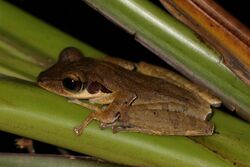Biology:Polypedates macrotis
| Polypedates macrotis | |
|---|---|

| |
| at Danum Valley Conservation Area, Sabah, Malaysia | |
| Scientific classification Error creating thumbnail: Unable to save thumbnail to destination
| |
| Domain: | Eukaryota |
| Kingdom: | Animalia |
| Phylum: | Chordata |
| Class: | Amphibia |
| Order: | Anura |
| Family: | Rhacophoridae |
| Genus: | Polypedates |
| Species: | P. macrotis
|
| Binomial name | |
| Polypedates macrotis (Boulenger, 1891)
| |
| Synonyms | |
|
Rhacophorus macrotis Boulenger, 1891 | |
Polypedates macrotis, commonly known as the dark-eared treefrog, sometimes also Bongao tree frog, Bongao bubble-nest frog, Baram whipping frog,[2] or brown-striped tree frog,[3] is a species of frog in the family Rhacophoridae. It is found in the central peninsular Thailand (requiring confirmation), Sumatra, Borneo, and Sulu Archipelago as well as a range of other Philippines islands (Palawan, Busuanga, Calauit, Jolo, and Dumaran).[2]
"Bongao" in the common name refers to Bongao Island, the type locality of Philautus montanus, now synonymized with Polypedates macrotis. On the other hand, "Baram", a district in Sarawak, is the type locality of Polypedates macrotis.[2]
Description
Male Polypedates macrotis grow to a snout–vent length of about 60 mm (2.4 in) and females to 85 mm (3.3 in). Tadpoles are up to 60 mm (2.4 in) in length. Dorsum is brown with a darker band behind the eye that covers the tympanum, tapering along the side.[4][5]
Polypedates macrotis is similar to Polypedates leucomystax but differs from it slightly in colouration and body proportions.[4]
Reproduction
Polypedates macrotis deposit their eggs in foam nests attached to leaves or twigs overhanging standing water, such as ponds and ditches.[1][4]
Habitat
It is a locally abundant species inhabiting primary forests and edge areas.[1] Adults can be found near small streams, swaps, ponds, puddles, or small pools.[5]
Gallery
References
- ↑ 1.0 1.1 1.2 Arvin Diesmos, Angel Alcala, Rafe Brown, Leticia Afuang, Genevieve Gee, Jeet Sukumaran, Norsham Yaakob, Leong Tzi Ming, Yodchaiy Chuaynkern, Kumthorn Thirakhupt, Indraneil Das, Djoko Iskandar, Mumpuni, Robert Inger, Robert Stuebing, Paul Yambun, Maklarin Lakim (2004). "Polypedates macrotis". IUCN Red List of Threatened Species 2004: e.T58955A11861817. doi:10.2305/IUCN.UK.2004.RLTS.T58955A11861817.en. https://www.iucnredlist.org/species/58955/11861817. Retrieved 14 November 2021.
- ↑ 2.0 2.1 2.2 Frost, Darrel R. (2014). "Polypedates macrotis (Boulenger, 1891)". Amphibian Species of the World: an Online Reference. Version 6.0. American Museum of Natural History. http://research.amnh.org/vz/herpetology/amphibia/Amphibia/Anura/Rhacophoridae/Rhacophorinae/Polypedates/Polypedates-macrotis. Retrieved 9 December 2014.
- ↑ "Polypedates macrotis". AmphibiaWeb: Information on amphibian biology and conservation. [web application]. Berkeley, California: AmphibiaWeb. 2014. http://www.amphibiaweb.org/cgi/amphib_query?where-genus=Polypedates&where-species=macrotis. Retrieved 10 December 2014.
- ↑ 4.0 4.1 4.2 Haas, A.; Hertwig, S.T. (2014). "Polypedates macrotis (Dark-eared Tree Frog)". Frogs of Borneo. http://frogsofborneo.org/index.php/rhacophoridae/290-rhacophoridae/polypedates/macrotis. Retrieved 10 December 2014.
- ↑ 5.0 5.1 "Polypedates macrotis". Amphibians and Reptiles of Peninsular Malaysia. http://www.amphibia.my/page.php?pageid=s_foundk&s_id=92&search1=Polypedates%20macrotis&species=Polypedates%20macrotis&submit=Search!. Retrieved 10 December 2014.
Wikidata ☰ Q2275703 entry
 |



